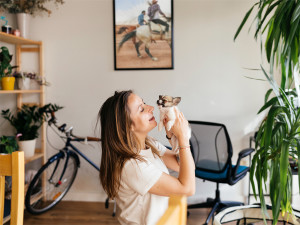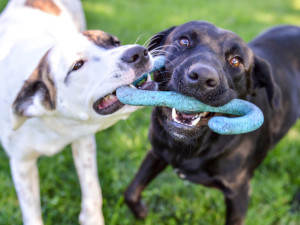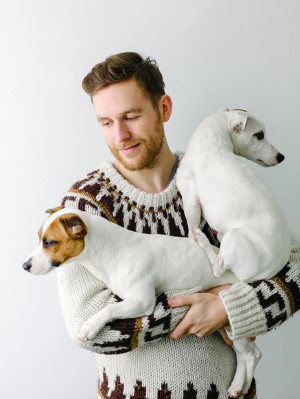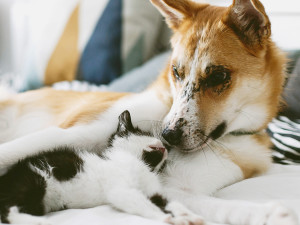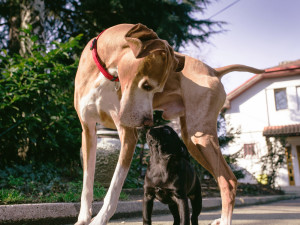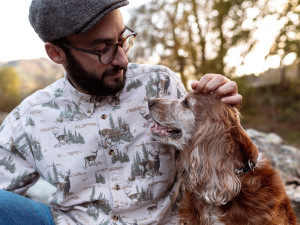Should You Get a Second Dog?
A few things to consider before expanding your fam by four more paws.
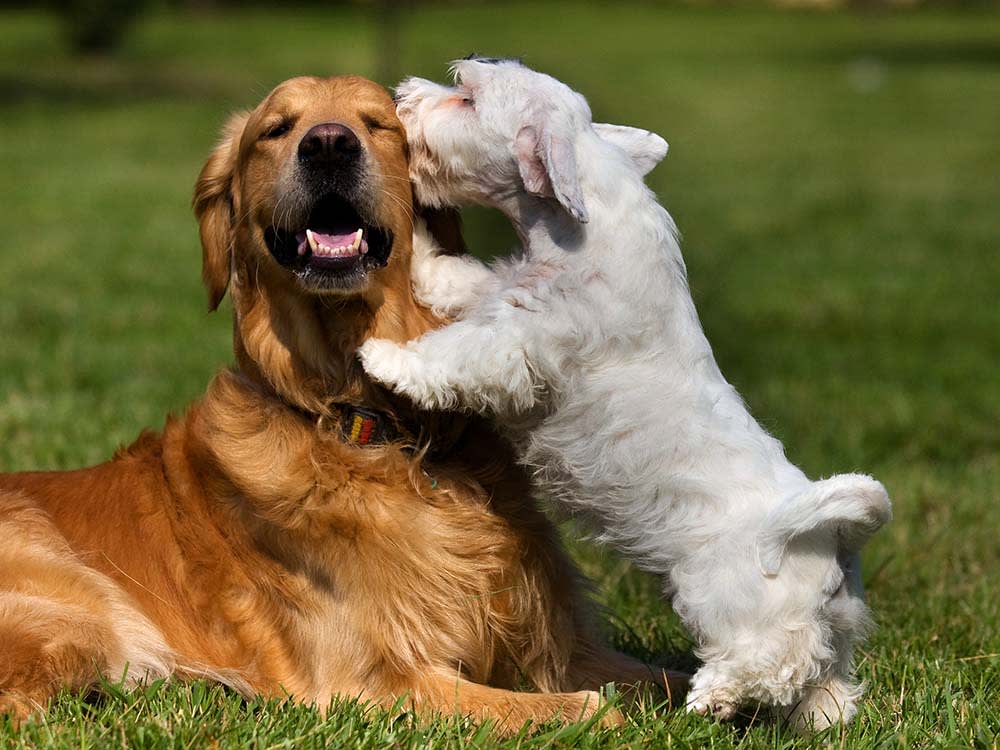
Share Article
Your dog is getting older, likes playing with other dogs, and doesn’t like being left alone. You want to give your dog the best life possible, and have heard that a dog buddy could be the key. So, should you get a second dog?
People often wonder this, but here’s the thing: If your thoughts of getting another dog are motivated primarily by a desire to do right by your current dog, there are other ways to accomplish that. Adding a second dog to your household is a big decision, and only you can decide if it’s the right thing to do.
Here‘s some solid advice: Only bring another dog into your life if you want one. The responsibility of caring for a new dog will be on your shoulders, and the decision should be based on what you honestly feel you’re willing and able to handle.
As you know, dogs require a big commitment of time, money, and emotion. It’s critical that your entire household is in agreement about getting a second dog, and that the reasons for adopting another one involve more than a desire (however well-intentioned and heartfelt) to make your current dog happy. In other words, don’t do it if your main reason is to fix a problem your current dog is having, or to fill some absence in their life.

Once you decide that you truly want another dog, here are some factors to consider.
Will Your Dog Be Happier With Another Dog?
Some dogs, including older dogs, are thrilled to have a new dog in the family. Many times, I’ve seen older dogs enjoy new dogs, whether the new dog is an adult, an adolescent, or a puppy. Sometimes, the addition of a younger, more playful dog will reinvigorate an older dog. They become more cheerful, more vibrant, and somehow more alive in their golden years, which is a beautiful thing to see.
On the other hand, I’ve also seen plenty of older dogs who are not happy to share their space and their people with a new dog. They end up irritated, and what should be a peaceful time in their life may be less serene because they are bothered by a pestering puppy.
This is where considering your dog’s perspective comes into play. There’s no way to know for sure, but there are clues you can use to guess how your dog may react to a second pup.
If your dog generally likes to play with other dogs, seems happy to see them while out on walks, and has positive encounters with other dogs, they are more likely to welcome a new dog. If your dog is easily able to handle other dogs being around their food and toys, that also means they may enjoy a new dog.
If your dog enjoys other dogs briefly and is then ready to get away, having another dog in the house all day, every day might not be the way to go. If they have arthritis or other chronic pain, they may also find it physically uncomfortable to have a play buddy around all the time. If they object to other dogs coming up to you, seeking your attention or being petted by you, your dog may struggle with having another dog in the family.
These potential issues are not deal breakers, but they mean that you’ll likely need to do more work once you’ve brought a new dog into the house. It may also mean that the dogs will need to be separated in certain situations or for some part of each day.
How to Choose the Right Sibling for Your Dog
If you decide to adopt a dog, choosing one who is compatible with your dog will increase the chances that the addition will have a positive impact. Two traits to consider are activity levels and play style.
If your dog wants to play for five minutes a couple of times a day and the new dog wants to play constantly, that will pose a challenge in their relationship. If your dog likes to wrestle and the new dog is all about chase games, that will require more compromise and teamwork than if they both enjoy tug, for example.
Age and size matter in some cases, but they are not necessarily as important as other qualities. Dogs of different ages and sizes can be the best of friends, but similarities in those categories may make it easier for them to develop a strong bond.
And then there’s the sex of the dogs. Millions of people have two female or two male dogs, but adopting a dog of the opposite sex is often advised, as it tends to reduce the risk of fights. While there’s no clear evidence related to how important gender might be in this situation, many behaviorists (I include myself here) anecdotally report that a majority of the worst cases of intra-household fighting tend to involve dogs of the same sex. So, in the spirit of making all things equal, if you already have a male dog, consider adopting a female.

Karen B. London, PhD, CAAB, CPDT-KA
Karen B. London is a certified applied animal behaviorist (CAAB) and certified professional dog trainer (CPDT) who specializes in working with dogs with serious behavioral issues, including aggression. She has written for a variety of magazines including The Bark, Clean Run, and the APDT Chronicle of the Dog, and has published in scientific journals including Behavioral Ecology and Sociobiology, Ethology, Ecology, and Evolution, the Journal of Insect Behavior, and Insectes Sociaux. She is the author of seven books about dog training and canine behavior, including the forthcoming My Dog's Mystery Adventure: And Other Stories From a Canine Behaviorist and Dog Trainer.
Related articles
![dog and cat snuggling together]()
Animal House: How to Intro a New Dog to Your Other Pets
...Without turning your home into a circus.
![Big dog sniffs little dog in greeting]()
How to Properly Introduce Two Pups
There’s a lot more to it than sniffing each other’s butts.
![Man with beard and wearing glasses and a grey hat sitting outside petting the head of his old foster dog]()
Foster Parenting 101: How to Be the Best Caregiver to Your Guest Pets
All the steps you can take.
![A woman with dark curly hair lifting a box with a plant in a pot balanced on top to another area in the home]()
How to Prepare for an Adoption Home Visit
7 tips for acing your inspection and bringing your new pup home.

